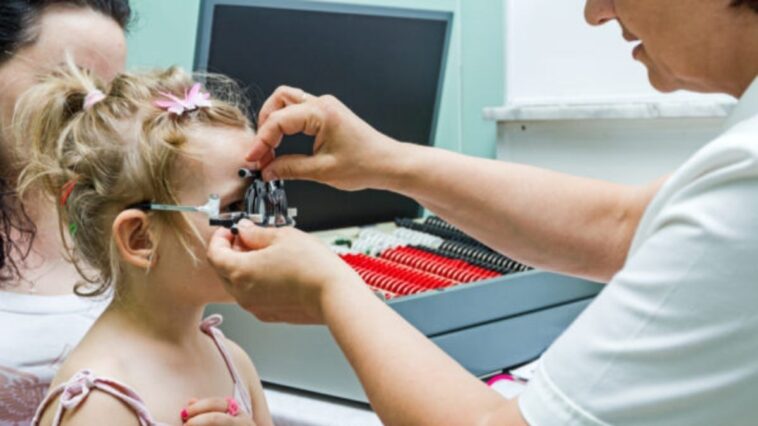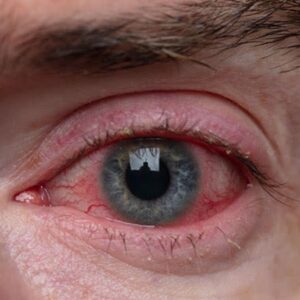What is Pediatric Optometrist?
A pediatric optometrist is an eye doctor specializing in eye care for children. They are trained to diagnose and treat vision problems in children of all ages, including infants and teenagers.
Pediatric optometrists are experts in evaluating and treating conditions that affect children’s vision development, such as nearsightedness, farsightedness, and astigmatism, as well as other conditions, such as strabismus (eye turn) and amblyopia (lazy eye). They also prescribe glasses and contact lenses, perform routine eye exams, and advise on maintaining good eye health.
Pediatric optometrists often work in private practices, schools, and children’s hospitals, and they have the skills and knowledge to ensure that children receive the best possible eye care.
Diagnosing and Treating Eye Conditions in Children.
Who Should See a Pediatric Optometrist?
A pediatric optometrist is an eye doctor specializing in diagnosing and treating children’s vision problems and eye conditions. Children who should see a pediatric optometrist include:
- Newborns should have their eyes examined by a pediatric optometrist to detect congenital eye problems.
- Infants: Infants should have their eyes examined at 6 months of age and again at 3 years old.
- Children with a family history of eye problems: Children with a family history of eye problems should be examined by a pediatric optometrist to monitor their eye health.
- Children with eye problems: Children with symptoms such as crossed or turned-out eyes, lazy eye (amblyopia), double vision, or frequent squinting should be examined by a pediatric optometrist.
- Children with developmental delays: Children with developmental delays or conditions such as autism may have vision problems that require specialized care from a pediatric optometrist.
- Children with special needs: Children with special needs, such as cerebral palsy or Down syndrome, may have vision problems that require specialized care from a pediatric optometrist.
By seeing a pediatric optometrist, children can receive specialized care for their eye health and vision development, which is essential for their overall well-being and quality of life.
Finding an Optometrist for Your Child
Finding the right optometrist for your child is vital to ensure their eye health and vision development. The following are some tips for finding an optometrist for your child:
- Ask for referrals: Ask your child’s pediatrician, family, and friends for recommendations from local optometrists who have experience treating children.
- Research optometrists online: Look for optometrists who specialize in pediatric care and check their online reviews and ratings to get a sense of their reputation.
- Schedule a consultation: Schedule a consultation with the optometrist to get a feel for their office, staff, and approach to care.
- Ask about their experience: Ask the optometrist about their experience treating children, their qualifications, and the types of services they offer.
- Check for certifications: Ensure that the optometrist is licensed and certified by the appropriate professional organizations.
- Consider the office environment: Look for an optometrist with a welcoming and child-friendly office environment, with age-appropriate toys and games to keep children entertained.
- Evaluate the staff: Assess the demeanor and professionalism of the optometrist’s staff, as well as their willingness to answer your questions and address any concerns.
By following these tips, you can find an optometrist who is well-suited to provide quality eye care services to your child and help ensure their eye health and vision development.
What Services Do Pediatric Optometrist Provide?
Pediatric optometrists provide various services to diagnose and treat children’s eye problems and vision disorders. Some of the services they provide include:
- Comprehensive eye exams: Pediatric optometrists perform comprehensive eye exams to evaluate a child’s vision, eye health, and development.
- Diagnosis and treatment of vision disorders: They diagnose and treat vision disorders such as nearsightedness, farsightedness, astigmatism, and lazy eye (amblyopia).
- Pediatric contact lens fitting: Pediatric optometrists can fit children with contact lenses, which can be a comfortable and convenient alternative to glasses.
- Treatment of eye diseases: They diagnose and treat diseases such as conjunctivitis, pink eye, and allergies that can affect children.
- Vision therapy: They provide vision therapy services to improve visual skills and treat visual problems such as double vision and eye tracking difficulties.
- Pre- and post-operative care: Pediatric optometrists provide pre-and post-operative care for children who require eye surgery, such as strabismus surgery.
- Specialized care for children with special needs: Pediatric optometrists provide specialized care for children with special needs, such as autism, cerebral palsy, and Down syndrome.
By providing these services, pediatric optometrists play a critical role in ensuring that children receive the care they need to maintain good eye health and achieve their full visual potential.
How Can Parents Help in the Care of their Child’s Vision?
Parents can help care for their child’s vision by:
- Regular eye exams: Schedule regular eye exams for your child starting at 6 months of age.
- Encouraging good habits: Teach your child good vision habits, such as looking away from the screen every 20 minutes and maintaining a healthy diet.
- Proper lighting: Ensure your child has proper lighting when reading or doing homework to reduce eye strain.
- Eye protection: Encourage your child to wear protective eyewear during sports or other activities.
- Screen time management: Limit screen time and encourage outdoor play to reduce eye strain caused by screens.
- Monitoring changes: Watch for signs of vision problems, such as squinting, rubbing eyes, or holding objects close to the face.
- Seeking help: If you suspect a problem, seek help from an eye doctor immediately.
The Risks of Poor Vision Care for Children
- Delayed development: Poor vision care can lead to delayed developmental milestones, such as speech and cognitive skills.
- Poor school performance: Children with undiagnosed or untreated vision problems may struggle in school, leading to poor grades and lower self-esteem.
- Risk of injury: Poor vision can increase the risk of accidents, such as tripping, falling, or bumping into objects.
- Eye strain and headaches: Prolonged screen use or straining to see can cause eye strain and headaches in children.
- Vision loss: Poor vision care can lead to progressive vision loss and potentially permanent vision damage.
- Development of other eye problems: Undiagnosed and untreated vision problems can lead to other eye problems, such as amblyopia (lazy eye) or strabismus (eye turn).
How Often Should Your Child Visit the Pediatric Optometrist?
The frequency of eye exams for children depends on various factors, but generally, it is recommended as follows:
- Infants (birth to 1 year): An eye exam should be done at 6 months of age.
- Toddlers (1 to 3 years): A yearly exam is recommended.
- Preschoolers (3 to 5 years): A yearly exam is recommended.
- School-aged children (6 to 18 years): An eye exam at least every two years, or more frequently, if the eye doctor recommends.
Children with a family history of eye problems, developmental delays, or other health conditions may need more frequent eye exams. It is best to consult a pediatric optometrist to determine the appropriate frequency of eye exams for your child.
Conclusion
Ensuring proper vision care for children is crucial for their overall development and well-being. Parents play an essential role in scheduling regular eye exams, encouraging good vision habits, and monitoring for any changes.
Additionally, it is vital to seek help from a pediatric optometrist if there are concerns about your child’s vision. By following these guidelines, children can have healthy eyesight and avoid the risks associated with poor vision care.






